July is Posture Month
Poor posture has almost become “normal” in our modern, technology oriented society. Everyone has a phone, kids as young as 2 years old know how to use them. Very few households lack screens of some kind, and most have TVs and computers.
So what is the impact and why should you care?
There are so many aspects of life that are impacted by our posture, and these will be explored in the next few weeks. But here’s a few things to get you thinking….
Did you know that you make up your mind about someone in the first 7 seconds of meeting them. You decide if you like them, if you trust them, are they a threat, are they interesting, worth talking to, are they healthy or unhealthy, are they kind, fun, exciting? All these questions and so many more are processed subconsciously as soon as you meet someone. It’s your nervous systems (brain, spinal cord and all the nerves in your body) job to assess your environment and decide if you’re safe or in peril so you are constantly scanning. So your nervous system and your past experiences will also colour what you see and experience (but that’s for another article)
So why is posture important in this situation?
Ask yourself - how often have you judged someone by how they look? Have you seen them as moody, distance, beaten-down, depressed, unattractive or unhealthy purely based on their posture and how they hold themselves? Have you thought them older than they actually were? Because if you’re saying you haven’t, then you are a rarity.
The thing about posture is it tells you a huge amount about that person. About how they feel in this moment, but also about their past history, the events that have set up their posture and determined their life experience. Our life experiences, both past and present, express through our posture and it tell people so much.
Our life experiences, both past and present, express through our posture
And whilst first impressions are really important, there is so much more to posture than that. Our posture is an indicator of long term health, how we adapt to and manage stress and how we feel about ourselves. All of this and more will be explored in the coming days and weeks.

